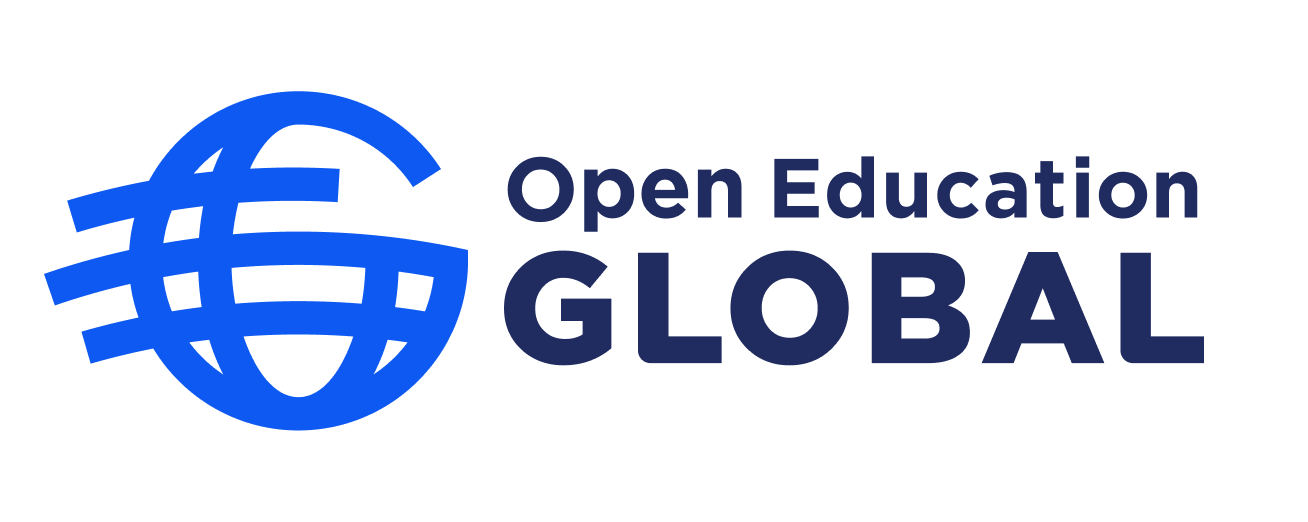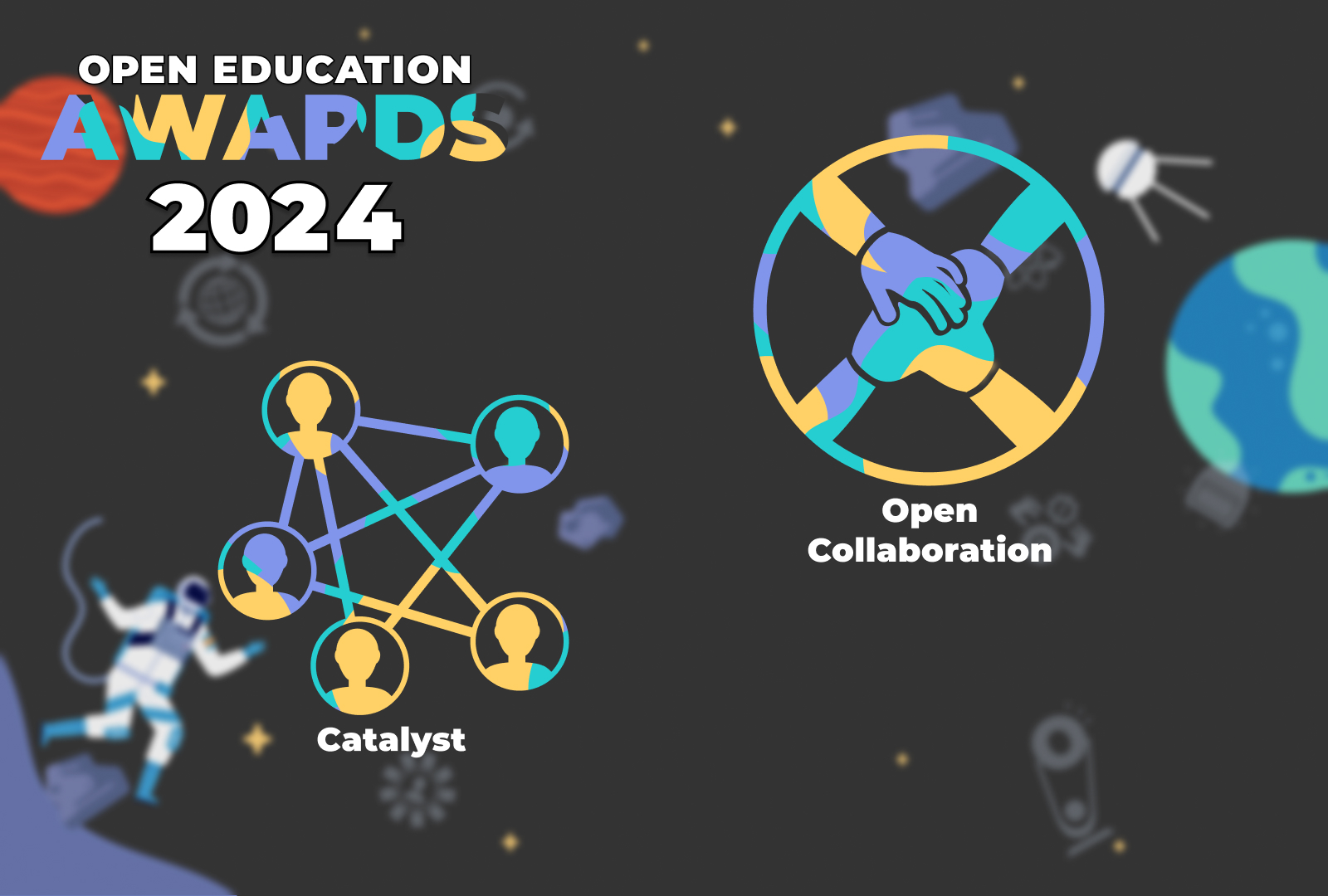This is the opening week of the 2024 Open Education Awards for Excellence! On Monday, the nomination forms became available for this year’s round of recognition. We have seen the first few nominations come in—we are off to a good start. We are hoping, though, to see many more, as we want to share all the people, projects, and resources nominated.
As part of our review of the sixteen award categories, we are highlighting two categories this week and sharing examples of previous award winners from each category. We aim to inspire you to consider a person or project to nominate this year! While we see the OE Awards as a means to honor our colleagues, there is nothing wrong with a self-nomination; who, after all, knows more about the nominee?
So far, we have focused on the Individual Award for Students and the Open Pedagogy Awards, and last week, we examined the Open Infrastructure and Diversity, Equity, and Inclusion award categories.
Today, we share with you the Individual Award for Catalysts (previously known as the Support Specialist Award) and the Open Collaboration Award. Combined, these awards demonstrate that the successes of Open Education often rely on teams of people working together—often many many people.
Focus on the Individual Award for a Catalyst

The Individual Awards for Excellence have long recognized people most visible as open educators– teachers and leaders. From 2020-2022 a new award category was created as the “Support Specialist Award” aimed at recognizing the wider range of key roles of instructional designers, media specialists, librarians, researchers, policymakers, administrators that enable open education. Previous awardees include Apurva Ashok of the Rebus Community (2021), Amy Hofer of Open Oregon (2021), Werner Westerman of the Library of Congress in Chile (2022), and Ewan MacAndrew, Wikimedian in Residence at the University of Edinburgh (2023). Read any of these award profiles to find an inspiring range of accomplishments in supporting open education.
At the same time, “support specialists” seemed like an underestimate of the role these individuals play in their organization and the larger open education community. Therefore, last year, we renamed this award the Catalyst Award, well exemplified by the 2023 awardee, Jennryn Wetzler of Creative Commons. As we heard in our recent podcast conversation with Jennryn, drawing from a Chemistry metaphor, this award describes someone who “helps other reactions happen without being consumed itself.”
Do you know someone who performs a catalyzing role like these previous award winners? Many people do this at all levels of our organizations. Please recognize their contributions by making a nomination this year for the Individual Award for a Catalyst.
Focus on the Open Collaboration Award

Within the Open Practices area of awards, the Open Collaboration category recognizes the network effect of projects and programs that transcend institutions and geographic boundaries. As the description suggests, this includes “communities of practice, joint project ventures, multi-institutional collaboration, multinational cooperation” and likely many more forms of collaboration.
In 2018 the award went to the CLIx program at the Tata Institute of Social Sciences. Clix supported thousands of secondary-level students in multiple states of India, including collaboration among teachers, school administrators, and government policymakers. The ever-expanding mentoring program of Open Education for a Better World (OPE4BW) won this award in 2020 and continues to be a key force in developing a network of the next leaders of open educators.
The awards to the Transformation by Innovation in Distance Education (TIDE) project (2021), Red PHAROS (2021), and European Network of Open Education Librarians—ENOEL (2022) highlight large-scale collaboration in Myanmar, Mexico, and across Europe. Last year’s Open Collaboration Award went to The National Teaching Repository, a community-driven resource that provides direct evidence of impact. While based in the UK, the open repository supports educators anywhere.
We expect there is more open collaboration out there than we can ever know, so help bring attention to the efforts that exemplify the best attributes of open education: working together.
What’s Next?
Do these examples make you think of either key individuals that enable your open education work or projects/programs that are effective in collaborative practices? We are ready now to accept your nomination in these or any categories.
Get started by reading the 2024 OE Awards Nomination Guide, which includes the kinds of information you will need to submit a nomination, planning documents, and some suggestions for entering your information. You can also go directly to this year’s nomination form, which might result in the awardees being recognized this year.
Stay tuned for next week’s post, including details and examples from two more award categories, or refer to the previous posts in this series.
- OE Awards 2024 Focus on Student Awards and Open Pedagogy Awards
- OE Awards 2024 Focus on Open Infrastructure and Diversity, Equity, and Inclusion Awards
If you have questions or suggestions about the awards, you can follow up with us in discussions below on these categories (and more) from the OE Awards space in OEG Connect.
Reply in OEG Connect
Do you have suggestions or questions about these award categories? We have an open discussion topic in OEG Connect available for this post.

